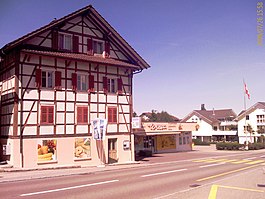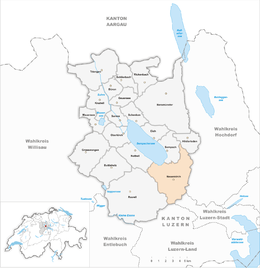Neuenkirch
| Neuenkirch | ||
|---|---|---|
 |
||
|
||
| Coordinates: 47°6′N 8°12′E / 47.100°N 8.200°ECoordinates: 47°6′N 8°12′E / 47.100°N 8.200°E | ||
| Country | Switzerland | |
| Canton | Lucerne | |
| District | Sursee | |
| Area | ||
| • Total | 25.48 km2 (9.84 sq mi) | |
| Elevation | 552 m (1,811 ft) | |
| Population (Dec 2015) | ||
| • Total | 6,646 | |
| • Density | 260/km2 (680/sq mi) | |
| Postal code | 6016,6203,6206 | |
| SFOS number | 1093 | |
| Surrounded by | Emmen, Hildisrieden, Lucerne, Malters, Nottwil, Rain, Rothenburg, Ruswil, Sempach | |
| Website |
www Profile (German), SFSO statistics |
|
Neuenkirch is a municipality in the district of Sursee in the canton of Lucerne in Switzerland.
Neuenkirch is first mentioned in 1256 as nova ecclesia. In 1259 it was mentioned as Nuwenkilch.
Neuenkirch has an area of 25.5 km2 (9.8 sq mi). Of this area, 71.2% is used for agricultural purposes, while 19.6% is forested. Of the rest of the land, 9.2% is settled (buildings or roads) and the remainder (0.1%) is non-productive (rivers, glaciers or mountains). In the 1997 land survey[update], 19.63% of the total land area was forested. Of the agricultural land, 67.65% is used for farming or pastures, while 3.49% is used for orchards or vine crops. Of the settled areas, 3.85% is covered with buildings, 0.47% is industrial, 0.51% is classed as special developments, 0.27% is parks or greenbelts and 4.04% is transportation infrastructure. Of the unproductive areas, 0.04% is unproductive flowing water (rivers) and 0.04% is other unproductive land.
The municipality is located on the upper end of Lake Sempach (Sempachersee). It consists of the village of Neuenkirch and the hamlets of Adelwil, Büezwil, Hälfestäge, Hellbühl, Homel, Lipperüti, Mättiwil, Rippertschwand, Rüeggringe, Trutige and Werlige as well as Schloss Wartensee.
Neuenkirch has a population (as of 31 December 2015) of 6,646. As of 2007[update], 8.2% of the population was made up of foreign nationals. Over the last 10 years the population has grown at a rate of 12.8%. Most of the population (as of 2000[update]) speaks German (95.0%), with Albanian being second most common ( 1.5%) and Serbo-Croatian being third ( 1.0%).
In the 2007 election the most popular party was the CVP which received 30.9% of the vote. The next three most popular parties were the FDP (27.1%), the SVP (24.8%) and the SPS (8.6%).
...
Wikipedia



